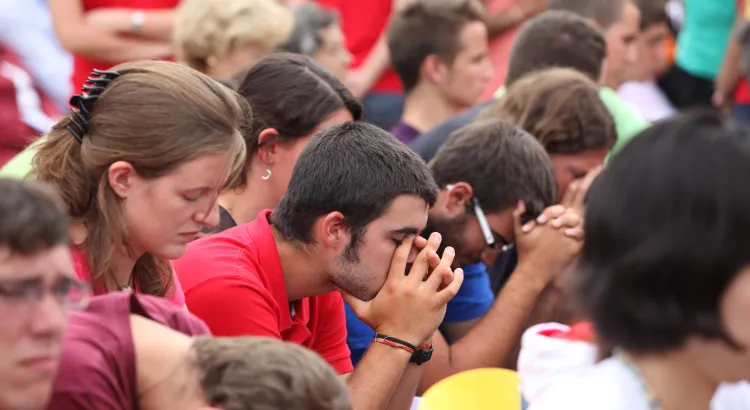Question:
Inquiry: Dear Father, I am writing to you from Brazil. I believe in the Holy Bible as the Word of God; but regarding Satan, I would like you to make some clarifications for me: Does the devil know what we think? Does he hear what we say? Is there danger in praying in a loud voice, in the sense that, knowing what we ask of God, he will spoil our plans?
Answer:
The thought of man, considered in itself, cannot be known except by God and by the person from whom the thought proceeds: as St. Thomas explains (1). The same is said in Sacred Scripture: More tortuous than anything is the human heart, beyond remedy; Who can understand it? I, the Lord, explore the mind and test the heart, giving to all according to their ways, according to the fruit of their deeds (Jer 17:9-10). St. Paul also testifies: For who among men knows the thoughts of a man except the spirit of the man which is in him? (1Co 2:11).
But the devil can predict our thoughts by another indirect way, namely, our mental and physical states, in the same way that a doctor knows a psychological condition by certain external symptoms. Our thoughts, in effect, translate into physical alterations, such as corporal despondency, dull gaze, and slow movements, which manifest in worried thoughts. If this helps men to discern, with certain probability, the hidden thoughts of some people, how much more can the good angel as well as the evil one do it, who have more experience than us about the behavior of men in general and of many of them in particular (for example, our guardian angels know very well our usual ways of thinking and acting, above all when we have a lot of trust in them and are accustomed to communicating together in prayer; and in the same way, the demons know sinners, especially those accustomed to following their inspirations). From here, St. Augustine says that “the demons sometimes discover the dispositions of men with great ease, and not only those they manifest by word, but also those conceived in thought”(2), because in the body is reflected the state of the soul; but the same saint, in his work “Retractions” affirms that he cannot be sure how this happens(3). This knowledge is, however, not only indirect but also purely conjectural, that is to say, speculative. Because people can have similar physical movements even though the thoughts and desires of their wills are different (for example, one can be pale and astonished before a disastrous thought that scares him, such as, for example, thinking of the death of a loved one, or before a thought that one considers too good, such as the possibility that would become engaged to be married); there is a great difference among people who may react with similar organic manifestations to diverse psychological phenomena. Neither the good angel nor the evil one can go beyond these external acts and try to draw conclusions in order to deduce what our thoughts might be. Regarding this, Lepicier says: “…although in this present state of life we cannot exercise our thinking or mental faculties without the concurrence of the senses, both internal and external, yet one and the same organic change can be applied to various objects; or in other words, can serve in order to express diverse formal concepts. With our free will we can imprint upon our mental operations an infinity of aspects, and direct them towards the most diverse ends, so that it is not possible, even to the acute angelic intelligence, to know, against our will, what is the actual intention or purpose of our mental operations”(4). This applies, as long as God, on His part, does not want to hinder the observations of the demons regarding some person in particular. For example, this is seen in the great doubts that assaulted the demons regarding Jesus, as evidenced by the temptations in the desert where the devil puts Our Lord to the test in order to know if He really is the Messiah.
However, in a direct way, they cannot know the thoughts that are in our mind or the desires and intentions in our will directly, unless we voluntarily open our soul. Thus explains St. Thomas Aquinas speaking not only about the demons but about angels in general (5). In the “Conferences of the Desert Fathers” John Cassian wrote: “The evil spirits cannot know the nature of our thoughts. They are only given the right to guess (to track, to detect) them through sensible signs or by examining well our dispositions, our words, or the things to which they notice a tendency on our part. On the contrary, what we have not exteriorized and have kept hidden in our souls is totally inaccessible to them. This includes the same thoughts that they propose to us, the reception that we give them, the reaction that they cause in us; They cannot know all of this through the same essence of the soul, but rather by the exterior movements and manifestations of man”(6).
Responding, then, to your questions, I should say: the devil neither knows what we think nor what we want unless we voluntarily allow him to know; he can suspect what we think, but he cannot know for sure. There is no danger in praying out loud, since even though he might know what our plans are, nothing can be done against them without the permission of God. On the other hand, in our prayers there is nothing that we should keep hidden since, as Saint Augustine and Saint Thomas explain, all that we can rightly pray can be summarized, ultimately, in the “Our Father” (“The Lord’s Prayer is most perfect, because, as Augustine writes, if we prayer rightly and fittingly, we can say nothing else but what is contained in this prayer of our Lord”(7). This prayer is known by the devil, and he can do nothing against it; he will be able to place obstacles, but he will always clash with the efficacy that Jesus has given to the prayers that we make in his name: Whatever you ask for in prayer with faith, you will receive (Mt 21:22; cf. Mc 11:24); Whatever you ask in my name, I will do, so that the Father may be glorified in the Son. If you ask anything of me in my name, I will do it (Jn 14:13-14).
Fr. Miguel A. Fuentes, IVE
Biography
1) Cf. Saint Thomas, On Evil, 16, 8.
2) Saint Augustine, The Divination of Demons, c. 5.
3) Saint Augustine, Retractions, L. 2, c. 30.
4) Lépicier, A. M., Il mondo invisibile, Vincenza (1922), 43, n. 4.
5) Cf. Saint Thomas, Summa Theologica, I, 57, 4.
6) John Cassian, Conferences, 7.
7) Saint Thomas, Summa Theologica, II-II, 83, 9.
Original Post: Here
Other Post: Is blasphemy always a sin?
















